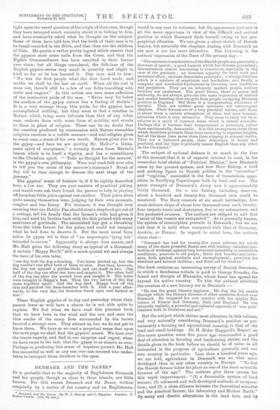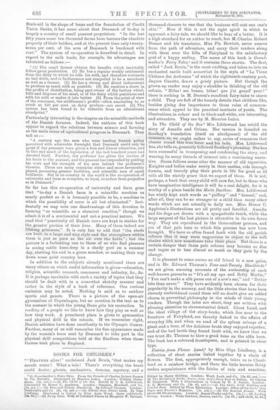DENMARK AND THE DANES.*
IT is probable that to the majority of Englishmen Denmark and her people, though BO close to these islands, are little known. For this reason Denmark and the Danes, written conjointly by a native of the country and an Englishman, D'n'necrk and the, Baum By W. J. Harvey and C. nepplen. London I T. Fisher IfInrriu. L125. ed. net.] would in any case be welcome ; but its appearance just now is all the more opportune in view of the difficult and critical position in which Denmark finds herself, owing to her geo- graphical situation. We are given a short sketch of Danish history, but naturally the chapters dealing with Denmark as
she now is are the more attractive. The following is the authors' impression of the Dane of the present day :-
"" The national characteristics of the Danish people are generosity ; slowness of speech ; a good humour which lies become proverbial ; determination almost amounting to truculence, especially in the case of the peasants ; an immense capacity for hard work and sustained effort 3 extreme democratic principles ; a strange fatalism which is a mixture of scepticism and hesitation; and, finally, a complete and wonderful fearlessness in throwing over traditions and prejudices. They are an intensely modern people, neither taciturn nor exuberant. The great Danes, those in power and authority, do not always give one the same impression of control and careful breeding that one gets from people, occupying the same position in England. But there is a compensating allowance of warmth. They are neither great optimists nor extravagant idealists. Their dreams are of a very practical nature, and there is about them a certain atmosphere of clean and sane humani- tarianism which is very attractive. They seem to carry out their reforms in a spirit of common sense which is almost scientific. Perhaps this is because their temperament is genuinely, rather than sentimentally, democratic. It is this averageness about them which doubtless prevents them from mounting to supreme heights, but at the same time saves them from slipping to colossal depths. They are a balanced people, their democracy is broad and practical, and the type is probably nearer English than any other on the Continent."
The subject of national defence is so much to the fore
at the moment that it is of especial interest to read, in the somewhat brief sketch of "Political History," how Denmark came by her present system, and how Herr Estrup, a hold and striking figure in Danish politics in the "seventies" and "eighties," succeeded in the face of tremendous oppo-
sition in fortifying Copenhagen both by land and sea. The peace strength of Denmark's Army now is approximately thirty thousand. On a war footing, including reserves, about a hundred and twenty-five thousand men could be mustered. The Navy consists of six small battleships, four coast defence ships of about four thousand tons each, twenty-
four torpedo-boats and destroyers, five or six submarines, and five protected cruisers. The authors are obliged to add that " most of the vessels are antiquated." As is generally known, the system of conscription prevails in Denmark ; but we are told that it is mild when compared with that of Germany, Austria, or France. In regard to social laws, the authors claim that— "Denmark has had for twenty-five years reforms for which, many of the more powerful States are still waiting—absolute pro- tection of workmen against long hours and unhealthy or unsuitable conditions ; pensions to old people ; State sick benefits and insur- ance, both against accidents and unemployment; provision for destitute and natural children ; and State aid for widows."
The book contains an interesting survey of Danish literature, in which a handsome tribute is paid to George Brandes, the friend and disciple of Nietzsche, whose fame has spread far beyond his native country. To him the authors attribute
the creation of a new literary era in Denmark :-
"He was the great literary engineer. He dug the big canals through which the literary streams of other countries flowed over Denmark. He irrigated his own country with the mighty Nile waters of France and Germany, Italy and England. He was intensely realistic, a powerful and cultured opponent of ' rose pink' idealism both in literature and art."
But the subject which claims most attention in this volume, and very naturally considering Denmark's position as pre- eminently a farming and agricultural country, is that of the land and small-holdings. Sir H. Rider Haggard's Report on this same question some five years ago commanded a good deal of attention in farming and landowning circles, and the details given in the book before us should be of value to all interested in the progress of agriculture generally and our own country in particular. Less than a hundred years ago,
we are told, agriculture in Denmark was no whit more developed than in any other country in Europe. " To-day the Danish farmer takes his place as one of the most scientific
farmers of the age." The authors give three causes for this rapid improvement : " (1) a favourable system of land tenure; (2) advanced and well-developed methods of co-opera- tion; and (3) a close alliance between the theoretical scientist and the practical farmer, the laboratory and Mother Earth." By many and drastic alterations in the land laws and by
State-aid in the shape of loans and the foundation of Credit Union Banks, it has come about that Denmark of to-day is largely a country of small peasant proprietors. "In the last fifty years some ten thousand farms have become the absolute property of their holders, and at the present time only twenty- 'seven per cent. of the area of Denmark is burdened with rent." The system of co-operation is described in detail. In regard to the milk trade, for example, its advantages are tabulated as follows :-
" (1) The small farmer obtains the benefits which inevitably follow great production. (2) Ile has a regular weekly settlement from the dairy to which he sells his milk, and therefore contracts no bad debts, and is furthermore not compelled to be a merchant as well as a farmer. (3) He has a strong and direct inducement to produee as much milk as possible. (4) He receives a share in the profits of distribution, being part owner of the factory which kills and disposes of his meat, or of the dairy which purchases and sells his milk or makes it into butter. (5) From the point of view of the consumer, the middlemen's profits—often amounting to as much as 120 per cent. on dairy produce—are saved. (6) The system has been found to be valuable from an educational standpoint."
Particularly interesting is the chapter on the scientific methods of the Danish farmers. Indeed, the authors of this book appear to regard the relations between science and farming as the main cause of agricultural progress in Denmark. They tell us :- "A century ago the men who were leading Danish policy perceived with admirable foresight that Denmark could only be groat if her peasants were given a free and liberal education, and to this end much of the legislation of the last hundred years had devoted itself. Further, the professor has given the service of his brain to the peasant, and the peasant has responded by putting his work and the strength of his arm behind the professor's theories. There are many countries richer and more favourably placed, possessing greater facilities, and scientific men of equal brilliance. But in no country in the world is the co-operation of university and farm so complete, so loyal, or so free from prejudice as in Denmark."
So far has this co-operation of university and farm gone that "to-day a Danish farm is a scientific machine as
nearly perfect as it is humanly possible to be, a machine in which the possibility of error is all but eliminated." Inci- dentally we may note one disadvantage of this devotion to farming "as scientific as a chemical reaction," though we admit it is of a sentimental and not a practical nature. We read that " practically all Danish cows are kept in stables for
the greater portion of their lives. Many of them indeed are lifelong prisoners." It is only fair to add that "the sheds are built in a large and airy style and the atmosphere within them is just as pure as the air over the fields "; but the picture is a forbidding one to those of us who find pleasure in seeing cattle knee-deep in a shady pool on a summer
day, chewing the cud in a green meadow, or making their way down some quiet country lane.
In addition to the subjects already mentioned there are Many others on which useful information is given—education, religion, scientific research, commerce and industry, Sze., &o. It is perhaps inevitable with such a variety of topics that they should be dealt with in a somewhat sketchy manner and rather in the style of a book of reference. One curious omission may be noted. Nothing is said as to outdoor sports and games. There is a picture of the open-air gymnasium at Copenhagen, but no mention in the text as to the manner in which the young Dane gets his recreation. In reading of a people we like to know how they play as well as how they work. A prominent place is given to gymnastics and physical drill in the schools. If we remember right, Danish athletes have done excellently in the Olympic Games. Further, many of us will remember the fine appearance made by the women's team sent by Denmark to take part in the physical drill competitions held at the Stadium when those Games took pities in England.















































 Previous page
Previous page